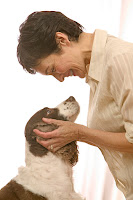
In this photo, the pet parent is giving her dog human loving attention. When you and your dog are relaxed, bonding and connecting your can look loving and briefly like the pet parent in this photo.
It is obvious by the upward tilt of the dogs head and the raised nose and his “soft eyes” that he dog has learned that his pet parents eye contact and head hold mean, "Mommy loves me. " I hope that he got this loving interaction after he has did something good, like brought her a toy, made his bed washed the dishes!
Pay attention to your dog when he is good. Your dog loves to get your attention. Just like a human child, your dog will do things to be noticed. Here is what is important. He will do something and then watch your body language to see how you respond.
If you notice him and make eye contact when he is doing something bad, chewing a slipper, getting on the sofa, then guess what he may do that very same thing. Your look, your attention is rewarding. Read the post on dog’s interpretation of eye contact to learn all the different interpretation your dog can have from your look.
“Soft eyes” The dogs eyes are partially closed sometimes squinty. You really have t look the whole dog to see if a dog has “soft eyes” Look at the dog’s posture, facial expression and eye position to make sure the dog is relaxed and non-threatening. Softness can be read in a slight squint, the rest of the facial features relaxed, the lips long and the commeasure back and the ears neutral (neutral is different for different dogs but one tell for softness is that the ears are not back pressed against the head or spread out and tense like antenna.
Patti Wood, MA, Certified Speaking Professional
The Body Language Expert
Web- http://www.PattiWood.net
I have a new quiz on my YouTubestation. Check it out!
YouTube- YouTube - bodylanguageexpert's Channel

